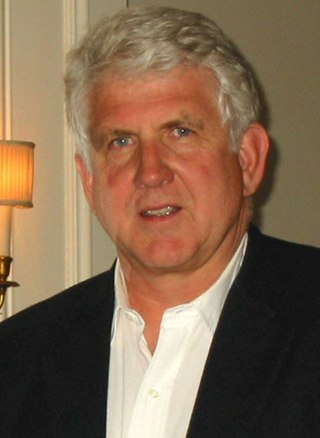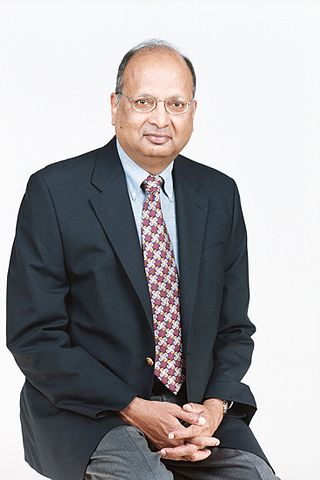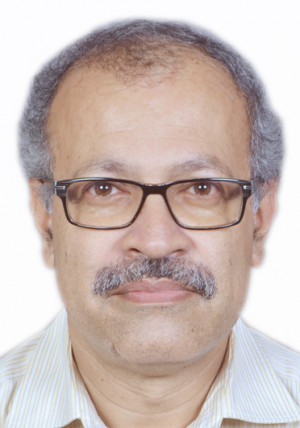
The Institute of Electrical and Electronics Engineers (IEEE) is an American 501(c)(3) professional association for electronics engineering, electrical engineering, and other related disciplines.

Robert "Bob" Melancton Metcalfe is an American engineer and entrepreneur who contributed to the development of the internet in the 1970s. He co-invented Ethernet, co-founded 3Com, and formulated Metcalfe's law, which describes the effect of a telecommunications network. Metcalfe has also made several predictions which failed to come to pass, including forecasting the demise of the internet during the 1990s.

Jun-ichi Nishizawa was a Japanese engineer and inventor. He is known for his electronic inventions since the 1950s, including the PIN diode, static induction transistor, static induction thyristor, SIT/SITh. His inventions contributed to the development of internet technology and the Information Age.
Arun N. Netravali is an Indian–American computer engineer credited with contributions in digital technology including HDTV. He conducted research in digital compression, signal processing and other fields. Netravali was the ninth President of Bell Laboratories and has served as Lucent's Chief Technology Officer and Chief Network Architect. He received his undergraduate degree from IIT Bombay, India, and an M.S. and a Ph.D. from Rice University in Houston, Texas, all in electrical engineering. Several global universities, including the Ecole Polytechnique Federale in Lausanne, Switzerland, have honored him with honorary doctorates.
Gottfried Ungerboeck is an Austrian communications engineer.

Francis Patrick Kelly, CBE, FRS is Professor of the Mathematics of Systems at the Statistical Laboratory, University of Cambridge. He served as Master of Christ's College, Cambridge from 2006 to 2016.
Ernst Adolph Guillemin was an American electrical engineer and computer scientist at the Massachusetts Institute of Technology who spent his career extending the art and science of linear network analysis and synthesis. His nephew Victor Guillemin is a math professor at MIT, his nephew Robert Charles Guillemin was a sidewalk artist, his great-niece Karen Guillemin is a biology professor at the University of Oregon, and his granddaughter Mary Elizabeth Meyerand is a Medical Physics Professor at the University of Wisconsin-Madison.

Arogyaswami J. Paulraj is an Indian-American electrical engineer, academic. He is a Professor Emeritus (Research) in the Dept. of Elect. Engg. at Stanford University.

Richard H. Frenkiel is an American engineer, known for his significant role in the early development of cellular telephone networks.
Simon Haykin is an electrical engineer noted for his pioneering work in Adaptive Signal Processing with emphasis on applications to Radar Engineering and Telecom Technology. He is currently Distinguished University Professor at McMaster University in Hamilton, Ontario, Canada.

Chai Keong Toh is a Singaporean computer scientist, engineer, industry director, former VP/CTO and university professor. He is currently a Senior Fellow at the University of California Berkeley, USA. He was formerly Assistant Chief Executive of Infocomm Development Authority (IDA) Singapore. He has performed research on wireless ad hoc networks, mobile computing, Internet Protocols, and multimedia for over two decades. Toh's current research is focused on Internet-of-Things (IoT), architectures, platforms, and applications behind the development of smart cities.
Tamara Macushla Munzner is an American-Canadian scientist. She is an expert in information visualization who works as a professor of computer science at the University of British Columbia (UBC).
Mangalore Anantha Pai was an Indian electrical engineer, academic and a professor emeritus at the University of Illinois at Urbana–Champaign. A former professor of electrical engineering at the Indian Institute of Technology, Kanpur, he is known for his contributions in the fields of power stability, power grids, large scale power system analysis, system security and optimal control of nuclear reactors and he has published 8 books and several articles. Pai is the first India-born scientist to be awarded a PhD in electrical engineering from the University of California, Berkeley.

Soumitro Banerjee is an Indian electrical engineer and former director of the Indian Institute of Science Education and Research, Kolkata. He is known for his studies on bifurcation phenomena in power electronic circuits and is an elected fellow of all three major Indian science academies: the National Academy of Sciences, India, Indian Academy of Sciences, and Indian National Science Academy. He is also a fellow of The World Academy of Sciences, Institute of Electrical and Electronics Engineers, West Bengal Academy of Sciences and the Indian National Academy of Engineering. The Council of Scientific and Industrial Research, the apex agency of the Government of India for scientific research, awarded him the Shanti Swarup Bhatnagar Prize for Science and Technology, one of the highest Indian science awards for his contributions to Engineering Sciences in 2003.
Ranjan Kumar Mallik is an Indian electrical and communications engineer and a professor at the Department of Electrical Engineering of the Indian Institute of Technology, Delhi. He held the Jai Gupta Chair at IIT Delhi from 2007 to 2012 and the Brigadier Bhopinder Singh Chair from 2012 to 2017. He is known for his researches on multiple-input multi-output systems and is an elected fellow of all the three major Indian science academies viz. Indian Academy of Sciences, Indian National Science Academy, and The National Academy of Sciences, India. He is also an elected fellow of The World Academy of Sciences, Indian National Academy of Engineering, and The Institute of Electrical and Electronics Engineers, Inc.
Yendluri Shanthi Pavan is an Indian electrical engineer and a professor at the Department of Electrical Engineering of the Indian Institute of Technology, Madras. He is known for his studies on mixed signal VLSI circuits and is an elected fellow of the Indian National Academy of Engineering. He is also a fellow of IEEE. The Council of Scientific and Industrial Research, the apex agency of the Government of India for scientific research, awarded him the Shanti Swarup Bhatnagar Prize for Science and Technology, one of the highest Indian science awards for his contributions to Engineering Sciences in 2012.
Venkata Narayana Padmanabhan is a computer scientist and principal researcher at Microsoft Research India. He is known for his research in networked and mobile systems. He is an elected fellow of the Indian National Academy of Engineering, Institute of Electrical and Electronics Engineers and the Association for Computing Machinery. The Council of Scientific and Industrial Research, the apex agency of the Government of India for scientific research, awarded him the Shanti Swarup Bhatnagar Prize for Science and Technology, one of the highest Indian science awards for his contributions to Engineering Sciences in 2016.
Petar Popovski is an electrical engineer at Aalborg University in Denmark. He was named a Fellow of the Institute of Electrical and Electronics Engineers (IEEE) in 2016 for his work in network coding and multiple access methods in wireless communications. He did BSc and MSc at the Ss. Cyril and Methodius University in Skopje and PhD at Aalborg University.
Jia Wang is an engineer at AT&T Labs Research in Bedminster, New Jersey. Wang was named a Fellow of the Institute of Electrical and Electronics Engineers (IEEE) in 2016 for contributions to measurement and management of large operational networks.
Neelesh B. Mehta is an Indian communications engineer, inventor and a professor at the Department of Electrical and Communications Engineering of the Indian Institute of Science who studies wireless networks.







